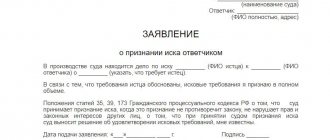What it is?
An easement is a special type of agreement provided for by law, which presupposes the emergence and regulation of the right to establish limited use of someone else’s property (Clause 1 of Article 274 of the Civil Code of the Russian Federation). The procedure is carried out taking into account the following features (paragraphs of Article 274 of the Civil Code of the Russian Federation are indicated in brackets):
- the owner of the land plot retains the right to own and operate it (clause 2);
- registration of the agreement is carried out in accordance with the regulations adopted regarding the registration of real estate (clause 3);
- a demand for an easement, if it is difficult to reach an agreement with the owner, may be raised in court (clause 3);
- the agreement is concluded for a limited or permanent period, i.e. indefinitely (clause 4);
- use of the site may be provided for a fee (clause 5);
- it is permissible to conclude an agreement in relation to state and municipal property (clause 6).
Reference. The right to limited use arises only in relation to real estate (Article 277 of the Civil Code of the Russian Federation).
If the ownership of the encumbered land plot passes to another person, then the easement does not expire, but is transferred together with the real estate (clause 1 of Article 275 of the Civil Code of the Russian Federation). Thus, an easement agreement is a way to establish and regulate the right to use part of someone else’s land , as well as to indicate in writing the conditions, terms and details of the parties to the agreement.
We will tell you more about what an easement is, how and when it is formalized, in a separate article.
Sample easement agreement for passage
Thus, the acquisition of the right to use someone else’s land plot, as well as the protection of rights in relation to real estate that is encumbered by an easement, require qualified legal support. An easement can be established to ensure passage and passage through a neighboring land plot or other property, the laying and operation of power lines, communications and pipelines, water supply and land reclamation, construction, as well as other needs of the owner of real estate that cannot be provided without the establishment of an easement. .
We recommend reading: Taxes on donating an apartment
Other goals. If it is necessary to use a neighboring plot for personal purposes, an appropriate agreement must be concluded between the two parties. This easement can be achieved in two ways: if the owner of a neighboring plot agrees to provide his land for use, the agreement is concluded on a voluntary basis; If you are unable to obtain the right to use part of a neighboring plot, you should go to court.
Purpose
Private and public easements are established in cases where the owners of neighboring or nearby land plots, as well as government authorities, need to use part of someone else’s property. In accordance with paragraph 4 of Art. 23 of the Land Code of the Russian Federation, a public agreement is concluded for the purposes of:
- ensuring travel or access to public facilities;
- placement of geodetic objects;
- laying engineering and cable networks;
- carrying out land and water works;
- movement or grazing of farm animals;
- haymaking, hunting, fishing, agricultural fishing;
- construction of road and automobile lines;
- construction of engineering structures and structures.
The purpose of a private easement is determined by the agreement of the parties to the agreement, for example, if it is necessary to place a through public roadway or lay a cable on the territory of a neighboring plot.
Parties

In this case, the users and holders of the easement may become:
- individuals;
- individual entrepreneurs;
- legal entities;
- municipal organizations;
- executive agencies.
The parties to the agreement are the owner of the property encumbered by the easement (landowner) and the owner of the property in whose favor the agreement is concluded (easement). In some cases, a servitude may be a person using the property on the basis of indefinite or lifelong residence, for example, under a rent agreement, as well as a tenant (Article 39.24 of the Land Code of the Russian Federation).
Terms of payment

- The Government of the Russian Federation in relation to real estate under federal ownership.
- Regional Government of the constituent entities of the Russian Federation, if the property belongs to regional authorities.
- Local government authority in relation to municipal real estate.
Funds transferred in favor of the land user are directed to the regional, municipal or federal budget of the Russian Federation, or to the benefit of a certain person or group of persons who are the subjects of a private agreement (clause 3). The fee by private agreement is established in accordance with Art. 424 of the Civil Code of the Russian Federation by mutual agreement of the parties.
Reference. When assessing the value of an easement, you can use the recommendations of Roszemkadastr dated March 17, 2004.
We talk about the methodology for determining and the procedure for paying fees for an easement on a land plot in this article.
Validity
The duration of the agreement is regulated by Art. 19 43 of the Federal Law of the Russian Federation. In all cases provided for by the Land Code of the Russian Federation, the validity period of the agreement is established:
- for the period specified in the text of the agreement;
- for an unlimited period with the possibility of transferring rights by inheritance/contract;
- for a period of no more than 2 years, if the intended purpose of the agreement involves carrying out regional, federal work, research or survey work.
When establishing an easement in connection with the operation of regional or federal linear facilities, the contract is concluded for an unlimited period (clause 3 of Article 19).
If the text of the agreement does not stipulate the validity period of the easement, then the agreement continues to be valid for 5 years from the date of conclusion (clause 4 of article 19).
We also talk about how long an easement can be established in this material, and here you can learn about the types and classification of easements by duration.
Terms of the easement agreement and its execution
- Passage or travel to the land plot of one owner can only be done through the plot of another owner, and it is not possible to change this situation in any other way.
- The source of water (well, spring, stream, pond, etc.) is located only on one of the sites. The use of such a source can only be carried out with the consent of the owner of the site, but this consent must become an agreement, since it is in this case that the use will become permanent and independent of voluntaristic decisions.
- Communication lines can only pass through one of the plots, the owner of which will be obliged to allow people servicing these communications into their possessions.
Thus, when establishing an easement, conditions must arise that are of a force majeure nature. This category does not include cases where crops or buildings on one site interfere with the use of another site, since buildings, crops, trees can be removed by mutual agreement or by a court decision.
We recommend reading: Filiation is the acquisition of citizenship
Grounds for termination

The parties to the agreement list in the agreement the circumstances upon the occurrence of which the agreement terminates. They could be:
- expiration of the validity period provided for by the contract;
- unification of land plots of the land user and the servitude;
- unilateral or mutual expression of will of the subjects of the agreement;
- there is no need to use the easement for a certain period, for example 3 years.
Attention. According to Art. 276 of the Civil Code of the Russian Federation, the grounds for termination of an easement are the disappearance of the need for limited exploitation of the property (clause 1), as well as a court decision if the encumbrance limits the possibility of using the site for its intended purpose (clause 2).
We also provide a list of grounds for termination of an easement in a separate material.
Thus, owners of real estate, if necessary, have the right to enter into an agreement to grant a limited right to use the site or part of it to another owner. In this case, the subject of the agreement can be both private and state property. The document necessarily regulates the rights and obligations of the parties, the duration of the agreement, as well as the amount and terms of payment.
Step-by-step instructions for drawing up a sample application
The procedure for establishing a private easement involves two possible scenarios. The first option is based on the voluntary consent of citizens and implies the following actions :
- Before registering a private easement, the owner of a land plot or building interested in its creation must contact the owner of the plot with a written proposal to grant the right to limited use of his territory.
In the petition, the interested person sets out in detail the grounds for concluding the upcoming agreement and confirms his right with regulatory legislative acts. The application is accompanied by a plan of the part of the land plot to which the encumbrance will be applied and a draft of the future agreement. - Upon reaching agreement, the parties enter into the necessary agreement. The agreement between the owner and the user provides for the following clauses:
- information about the parties entering into the agreement;
- the subject of the agreement (part of the territory), indicating the grounds for concluding the agreement provided by law, the address and cadastral number of the site;
- indication of the size, location of the site, type of work performed;
- terms of use of land territory;
- the person bearing all costs associated with encumbering the site;
- the procedure for limited use of land;
- rights and obligations of the parties;
- final terms;
- payment for easement indicating the amount of payments;
- procedure for concluding disputes;
- force majeure;
- addresses and details of the parties.
- A properly drawn up agreement is subject to state registration in Rosreestr. Registration involves the provision of the following documents: application from the interested party;
- passports of citizens who signed the application (copies of passports);
- agreement signed by the parties;
- a photocopy of the receipt for payment of the state fee;
- a certified copy of the court order (when going to court);
- cadastral passport, plot diagram (as well as copies of these documents).
We do not recommend completing the documents yourself. Save time - contact our lawyers by phone:
8 (800) 350-29-87Moscow
Important! The form of the agreement is very important for concluding a transaction; if the agreement is not drawn up properly, the court may invalidate the transaction. Before concluding an agreement, it is necessary to purchase legally executed forms of the agreement concluded between citizens.
We do not recommend completing the documents yourself. Save time - contact our lawyers by phone:
8 (800) 350-29-87Moscow
Validity period and cost of the procedure
The period of validity of the easement is specified in an agreement signed by the parties, and provides for a fixed-term period , which indicates the expiration dates of the agreement and a permanent one. The duration of the permanent period is not limited and the right to use the territory remains valid until the agreement is terminated or the grounds for its validity cease.
The cost of the procedure for registering a land easement implies the payment of a state duty for citizens in the amount of 2,000 rubles (Tax Code of the Russian Federation, Article 333.33, paragraph 22).
The cost of encumbering the rights of a citizen who has allowed another owner to use a limited right is calculated from the cadastral value of the allotment within 0.01% per year of the easement. By agreement of the parties, another amount may be included in the agreement concluded between the parties, providing compensation to the party burdened with rights for the inconvenience caused.
On our website there are other articles about various types of easements, from which you will learn:
- What is a public easement, who establishes it, and what is its difference from a private one?
- What are personal and urban easements?
- Features of easements on a forest plot.
Coming into effect
Mandatory registration of the agreement signed by citizens in Rosreestr determines the time for the private easement to come into force. The date of registration of the document is the beginning of the agreement concluded between the parties .
The owner interested in signing the agreement enters into the rights of limited use of the territory, and the owner burdened by the agreement cedes this right to him on the basis of legislative acts of the Russian Federation.
Appeal to the courts
The disagreement of the owner of a neighboring plot of land to the voluntary establishment of an easement gives the interested party the right to seek protection of his rights in court. The judicial authorities, based on the documents provided by the plaintiff, will consider the filed claim and make their decision on whether to satisfy or deny the request of the interested citizen.
The judicial authorities take into account the interests of the parties and have the right to independently determine all acceptable conditions of a private easement. The court can independently establish the boundaries of travel through the site , and also consider the issue of compensation for the inconvenience caused to the owner of the site. The court decision is subject to mandatory implementation, and no one has the right to interfere with its implementation.
Reference! The owner of the encumbered plot, in case of violation of the agreement signed between citizens, also has the right to appeal to the courts with a claim.
We do not recommend completing the documents yourself. Save time - contact our lawyers by phone:
8 (800) 350-29-87Moscow







